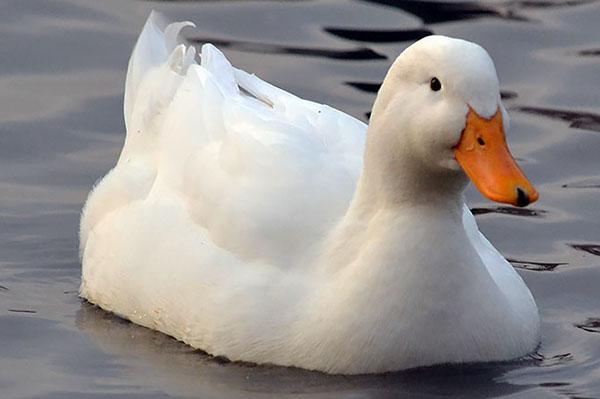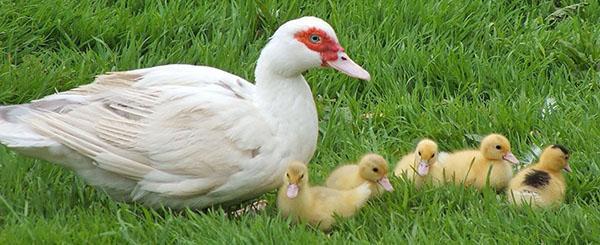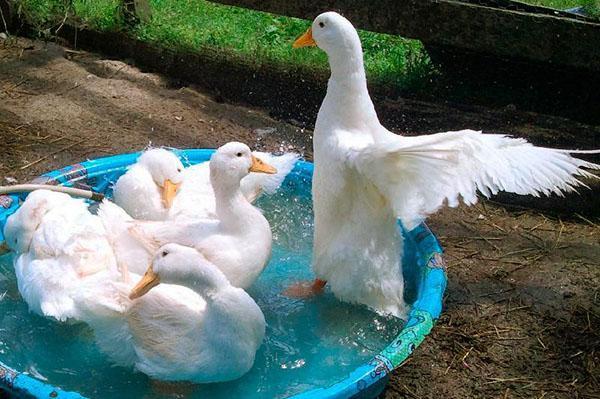How long does it take for ducks of different breeds to hatch chicks?
 How long a duck sits on eggs is influenced by its breed and egg size. Compared to chicken eggs, duck eggs are noticeably larger. The average weight of chicken reaches 58 grams, and that of duck's is 80 grams. They also contain a large amount of fat, which can quickly overheat the eggs. That is why, for the successful hatching of chicks, it is necessary to observe the required temperature regime and percentage of humidity.
How long a duck sits on eggs is influenced by its breed and egg size. Compared to chicken eggs, duck eggs are noticeably larger. The average weight of chicken reaches 58 grams, and that of duck's is 80 grams. They also contain a large amount of fat, which can quickly overheat the eggs. That is why, for the successful hatching of chicks, it is necessary to observe the required temperature regime and percentage of humidity.
How long do ducks of different breeds hatch eggs

The Pekinoks have a poorly developed instinct for breeding chicks, so they rarely hatch. Instead, they use ducks of other breeds, either chickens, geese or turkeys.

The number of eggs to be laid depends on the size of the bird. From 9 to 11 pieces are placed under the chicken, 11-15 pieces under the duck, 17-19 pieces under the turkey. If it's too cold outside, then lay 2-3 eggs less.
Indoor or musk duck
 How many days a musky duck sits - from 30 to 36 days. The number of eggs incubated is 12 to 20.
How many days a musky duck sits - from 30 to 36 days. The number of eggs incubated is 12 to 20.
In advance, before the duck is going to sit down, you need to increase the portion of the feed given to it, and also observe the feeding regime during incubation.
Indo-girls begin to rush towards the end of winter. If a duck pulls the fluff out of itself and tries to settle in one place, it means that it is preparing to sit on eggs. This happens most often in late March or early April. The duck nest is installed in a quiet and dark place. Individuals that have reached six months of age or older begin to lay eggs. They rush for 3-5 months, after which they shed. Once the molt is over, they rush again for about 12 weeks.
 In the first days of incubation, the Indo-female sits on eggs almost constantly. This is necessary in order for the embryo to begin to fully develop. Therefore, the feeder and drinker are placed as close to the nest as possible. It is also necessary to have a bathing tank, since water is needed to wet the eggs.
In the first days of incubation, the Indo-female sits on eggs almost constantly. This is necessary in order for the embryo to begin to fully develop. Therefore, the feeder and drinker are placed as close to the nest as possible. It is also necessary to have a bathing tank, since water is needed to wet the eggs.
Percent bred musky duck chicks naturally, significantly higher than if they were hatched in an incubator.
Indo-women throw unfertilized eggs out of the nest themselves. Regardless of how long the duck has already incubated eggs, it will sit until the last chick hatches. In order for the percentage of hatched chicks to be higher, it is necessary to use for hatching those eggs that have been lying for 2 weeks. In this case, they should be stored at a temperature between + 8 ° C and + 15 ° C in a horizontal position, and turned over daily.
Mulard
 To get chicks mulardov, you will need to cross a Peking duck with an Indo-Duck. For incubation, eggs collected in 1 week are used. It is possible to hatch mulard both in an incubator and in a natural way. Moreover, the latter method is much more effective, a larger percentage of chicks survive, sometimes even reaching 100%. In an incubator, losses can reach 40%. No more than 15 eggs are laid under one individual. After 10 days, they are examined with an ovoscope to identify spoiled ones.
To get chicks mulardov, you will need to cross a Peking duck with an Indo-Duck. For incubation, eggs collected in 1 week are used. It is possible to hatch mulard both in an incubator and in a natural way. Moreover, the latter method is much more effective, a larger percentage of chicks survive, sometimes even reaching 100%. In an incubator, losses can reach 40%. No more than 15 eggs are laid under one individual. After 10 days, they are examined with an ovoscope to identify spoiled ones.
Features of hatching chicks in an incubator
 For incubation of chicks of ducks, eggs of one week old are used, but not older, with the exception of eggs of musky birds.
For incubation of chicks of ducks, eggs of one week old are used, but not older, with the exception of eggs of musky birds.
Before putting in a large batch, you should check how quickly the device heats up the air and how long it keeps it warm. Better to try to breed just a few ducklings first.
Before laying the incubator, you need to carefully select the material. Eggs with the following disadvantages are rejected:
- non-standard form;
- with growths;
- heavily contaminated;
- with mold;
- cracks.
If the dirt is not removed, an infection can enter through the shell, due to which the embryo will die immediately. All hatching duck eggs must be treated with a weak solution of potassium permanganate using a sponge or spray to disinfect them and remove small contaminants. But it is better not to allow them to get dirty at all, but to keep the ducklings and aviary clean and dry.
Duck eggs are laid in trays in a horizontal position.
During the first week from the moment of laying, the circulatory system and organs develop in the embryo, therefore it is extremely important to ensure sufficient warming up at this time. The temperature should be at least + 38 ° С, humidity 70%. Eggs are turned over at least 4 times a day. In the second week, the skeleton is formed. At this time, the temperature is slightly lowered to + 37.8 ° C, and the humidity is also reduced to 60%. Turn over 4-6 times a day.
In the third week, the temperature and humidity are left the same, but a couple of times a day the eggs are cooled for 15-20 minutes at the same time, for example, at 8 am and at night. After cooling (after 15 minutes), they are sprayed from a spray bottle with a weak solution of potassium permanganate, while the temperature of the eggs should drop to + 28-30 ° C. Then they are heated again. Incubator must reach the maximum temperature within half an hour (maximum).
 Brood appears on 26-28 days (depending on breed). In the incubator, chicks hatch for the same amount of time as ducks sit on their eggs. The temperature at this stage is reduced to + 37 ° C, and the humidity, on the contrary, is significantly increased to 90%, so that the shell becomes softer and it is easier for the chicks to get out. There is no need to turn it over.
Brood appears on 26-28 days (depending on breed). In the incubator, chicks hatch for the same amount of time as ducks sit on their eggs. The temperature at this stage is reduced to + 37 ° C, and the humidity, on the contrary, is significantly increased to 90%, so that the shell becomes softer and it is easier for the chicks to get out. There is no need to turn it over.
For turning a large number of eggs, it is better to purchase trays with automatic rotation.
It is recommended to scan eggs with an ovoscope every 7 days. Thanks to the incubator, chicks can be hatched at any time of the year and in large numbers, and there is no need to fear that the brood hen will abandon them ahead of time.
 Depending on what was the feeding ration of the broodstock during egg-laying, it also depends on how long the ducks will hatch eggs. If the food was inadequate, the embryos develop more slowly, so they hatch later, and can be weak and small.
Depending on what was the feeding ration of the broodstock during egg-laying, it also depends on how long the ducks will hatch eggs. If the food was inadequate, the embryos develop more slowly, so they hatch later, and can be weak and small.